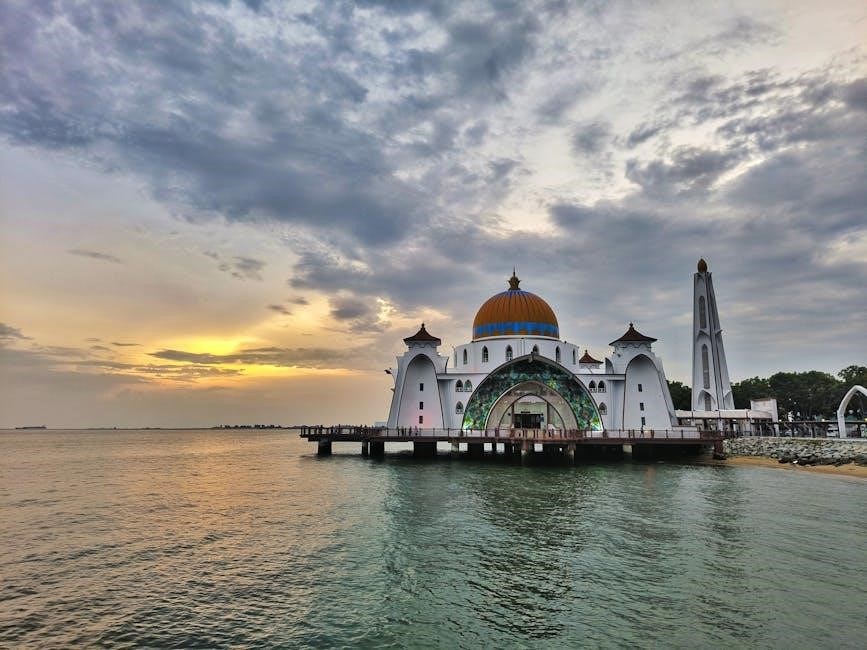Paul’s third missionary journey, lasting about four years (A.D. 53-57), focused on strengthening churches and spreading the gospel across Asia, Greece, and beyond, with Ephesus as a key hub.
1.1 Overview of Paul’s Missionary Journeys
Paul’s missionary journeys, spanning from approximately A.D. 46 to 57, were pivotal in spreading Christianity. His first journey (A.D. 46-48) introduced the gospel to Gentiles in Cyprus and Asia Minor. The second (A.D. 49-52) focused on strengthening existing churches and expanding into Macedonia and Greece. The third journey (A.D. 53-57), the longest, emphasized deepening the faith of believers, particularly in Ephesus, and preparing leaders for future ministry. These journeys laid the foundation for the spread of Christianity across the Mediterranean world.
1.2 Significance of the Third Journey
Paul’s third missionary journey was the longest and most impactful, lasting nearly four years (A.D. 53-57). It focused on deepening the faith of existing believers and establishing strong, self-sustaining churches, particularly in Ephesus, where he spent three years. This journey emphasized leadership training and preparing churches for future challenges, ensuring the gospel’s endurance. It also marked a shift toward more mature teachings, solidifying Christianity’s roots in Asia Minor and beyond.

The Beginning of the Third Missionary Journey
Paul’s third journey began in Antioch, Syria, around A.D. 51, as he set out to strengthen churches and preach the gospel, traveling through Phrygia and Galatia.
2.1 Departure from Antioch

Paul’s third missionary journey began with his departure from Antioch, Syria, a city that served as his home base and a central hub for his ministries. After spending several months in Antioch, Paul set out during the summer of A.D. 51, ready to embark on his longest and most extensive journey. Unlike his previous journeys, he traveled without Silas, indicating a shift in his missionary approach. This departure marked the beginning of a four-year endeavor to strengthen existing churches and preach the gospel to new regions, solidifying his commitment to spreading Christianity across Asia Minor and beyond.
2.2 Route Through Phrygia and Galatia
Paul traveled through Phrygia and Galatia, revisiting cities like Tarsus, Derbe, Lystra, Iconium, and Pisidian Antioch, to strengthen the disciples and preach the gospel. This route allowed him to reinforce the faith of existing believers and expand the reach of Christianity. The journey through these regions was a strategic move to ensure the churches were well-established before he proceeded further into Asia. This phase of his journey highlighted Paul’s dedication to nurturing the early Christian communities and preparing them for future challenges.
2.3 Arrival in Ephesus
Paul arrived in Ephesus, a major city in Asia Minor, where he spent approximately three years. He began by preaching in the synagogue, sharing the gospel with Jews and Gentiles. Despite initial acceptance, opposition arose, leading Paul to establish a separate ministry. This period marked the pinnacle of his missionary efforts, as Ephesus became a central hub for Christianity in the region. His extended stay allowed for deep discipleship and the spread of the gospel, solidifying Ephesus as a key location in his ministry.

Key Locations and Ministries
Paul’s third journey emphasized Ephesus as the central hub, with extensive ministry in Corinth and visits to Macedonia, Achaia, and surrounding regions.
3.1 Ephesus: The Heart of Paul’s Ministry
Ephesus served as the central hub of Paul’s third missionary journey, where he spent approximately three years (A.D. 53-57). This vibrant city, a major business and cultural center, provided an ideal platform for his ministry. Paul actively preached in the synagogue, engaging audiences with the gospel and kingdom of God. Despite facing opposition, he performed miracles, attracting widespread attention. Ephesus became a base for spreading Christianity across Asia, with his teachings and influence leaving a lasting legacy in the region.
3.2 Ministry in Macedonia and Achaia
During his third missionary journey, Paul extended his ministry to Macedonia and Achaia, strengthening existing churches and establishing new ones. In Macedonia, he revisited cities like Philippi and Thessalonica, encouraging believers. In Achaia, he spent significant time in Corinth, where he stayed for over a year, preaching and teaching. Corinth became a focal point, with Paul’s ministry flourishing despite challenges. His efforts in these regions solidified the spread of Christianity, leaving a lasting impact on the early church in Greece.
3.3 Visits to Corinth and Other Cities
During his third missionary journey, Paul spent significant time in Corinth, where he stayed for about a year and six months. This period was marked by fruitful ministry, as he preached boldly and established a strong church. Despite facing opposition from Jewish leaders, Paul received divine encouragement to continue his work. Additionally, he visited other cities, including Philippi, Thessalonica, and Berea, strengthening the churches and fostering spiritual growth. These visits underscored Paul’s dedication to spreading the gospel and nurturing believers across Greece.

Significant Events and Challenges
Paul faced significant challenges, including opposition from synagogue leaders and the demands of extensive preaching; He performed miracles and established strong churches during his journey.
4.1 The Ministry in the Synagogue of Ephesus
During his third missionary journey, Paul spent three years in Ephesus, where he began by preaching in the synagogue for three months. Using the prophets, he taught about the kingdom of God, gaining a receptive audience. However, opposition arose, and Paul was forced to leave the synagogue. He then moved his ministry to the school of Tyrannus, where he taught for two years. This period saw significant spiritual growth, with the gospel spreading widely in Asia, and the church in Ephesus becoming a strong, vibrant community under Paul’s leadership.
4.2 The Riot in Ephesus and Its Aftermath
A major disturbance erupted in Ephesus during Paul’s ministry. Silversmiths, led by Demetrius, stirred up a riot against Paul and his companions, fearing loss of income as people turned to Christianity. The mob filled the city’s theater, chanting against Paul. Though the riot was eventually calmed by the city clerk, it highlighted the growing tension between Christianity and local traditions. Paul, sensing danger, decided to leave Ephesus, ensuring the safety of his team and the continuity of the church’s work despite the turmoil.
4.3 The Farewell Speech to the Ephesian Elders
Before leaving Ephesus, Paul delivered a heartfelt farewell speech to the Ephesian elders, recorded in Acts 20:17-38. He reflected on his ministry, emphasizing humility, serving the Lord, and testifying to the gospel. Paul acknowledged his impending departure and potential imprisonment but entrusted the church to God’s grace. His emotional address underscored the importance of shepherding the flock and standing firm in faith. This speech marked a poignant moment, as Paul prepared the leaders for his absence, leaving a lasting legacy of devotion and perseverance.
The Journey to Jerusalem
Paul’s journey to Jerusalem involved traveling through Troas and Miletus, where he experienced the miraculous resurrection of Eutychus, reflecting his divine mission and unwavering determination.
5.1 Travel Through Troas and Miletus
During his journey to Jerusalem, Paul traveled through Troas, where he preached until midnight, miraculously raising Eutychus after he fell from a window. He then sailed to Miletus, where he met with Ephesian elders, delivering a heartfelt farewell speech emphasizing his commitment to the gospel and the challenges ahead. These stops highlighted Paul’s dedication to strengthening the churches and preparing leaders for the future, showcasing his spiritual and emotional investment in the mission.
5.2 The Incident with Eutychus in Troas
During Paul’s stay in Troas, he preached until midnight, causing Eutychus, a young man, to fall asleep and plunge from a third-story window. Believing him dead, Paul rushed downstairs, embraced the boy, and miraculously restored his life. This divine intervention strengthened the faith of the believers and demonstrated God’s power through Paul. The incident served as a testament to Paul’s ministry and the supernatural work of God during his journeys, inspiring confidence in the gospel’s transformative power.
5.3 The Final Destination: Jerusalem
Paul’s third missionary journey culminated in Jerusalem, a city steeped in religious and cultural significance. Arriving after traveling through Troas and Miletus, Paul intended to celebrate Pentecost and fulfill his vow. Despite warnings of impending danger, he was determined to complete his mission. Upon arrival, he was warmly received by the believers but faced growing tensions with Jewish leaders. This visit marked a pivotal moment, as it led to his arrest and eventual imprisonment, setting the stage for the spread of the gospel to Rome. Jerusalem was both the end of one journey and the beginning of another.

The Legacy of the Third Missionary Journey
Paul’s third journey established strong churches, deepened theological understanding, and set the stage for future missions, leaving a lasting impact on early Christianity and beyond.
6.1 The Establishment of Strong Churches

Paul’s third missionary journey played a pivotal role in establishing robust churches across Asia Minor, Greece, and beyond. During his extended stay in Ephesus, Paul invested heavily in discipleship and leadership training, ensuring the churches were well-founded. He strengthened existing congregations in cities like Corinth and Philippi, while also planting new churches in strategic locations. These churches became vibrant centers of faith, resilient despite challenges like the riot in Ephesus. Paul’s efforts laid a solid foundation for the growth of Christianity, enabling these communities to thrive and spread the gospel further.
6.2 The Impact of Paul’s Teachings
Paul’s teachings during his third missionary journey profoundly shaped the early Christian church. In Ephesus, he spent three years preaching the kingdom of God, transforming lives and unifying Jewish and Gentile believers. His message emphasized grace, faith, and the unity of all believers in Christ, creating a strong spiritual foundation. The gospel spread rapidly, influencing cities beyond Asia, such as Corinth and Philippi. Paul’s teachings not only converted many but also equipped leaders to carry on his work, ensuring the enduring legacy of his ministry.
6.3 The Foundation for Future Missions
Paul’s third missionary journey laid a lasting foundation for future missions by establishing strong, self-sustaining churches. His extensive ministry in Ephesus and other cities created a network of believers who could propagate the gospel independently. Paul trained leaders like Timothy and Erastus, ensuring continuity. His journeys demonstrated the importance of perseverance and adaptability in missionary work. The principles he taught, such as reliance on faith and grace, became cornerstones of Christian doctrine. This period also marked the beginning of his epistles, which continue to guide the church today.
